John Janaro's Blog, page 56
April 14, 2023
The Growing Things of Spring
From the trees and the bushes and the ground, flowers bloom and leaves take shape. Spring 2023 is here! (Photographs by JJ)

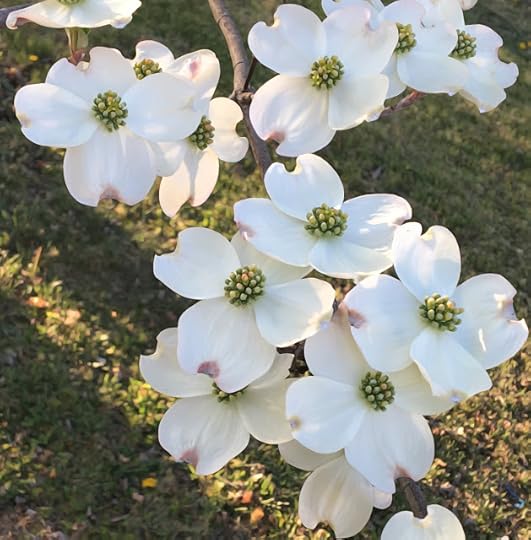
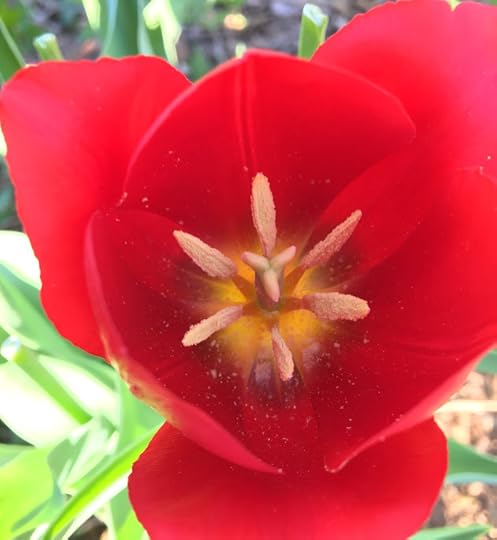
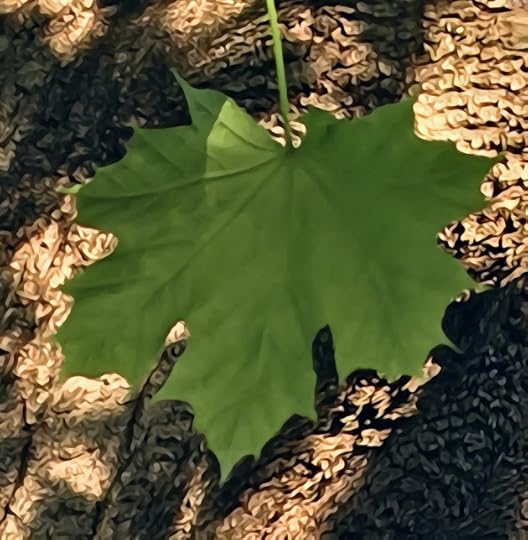
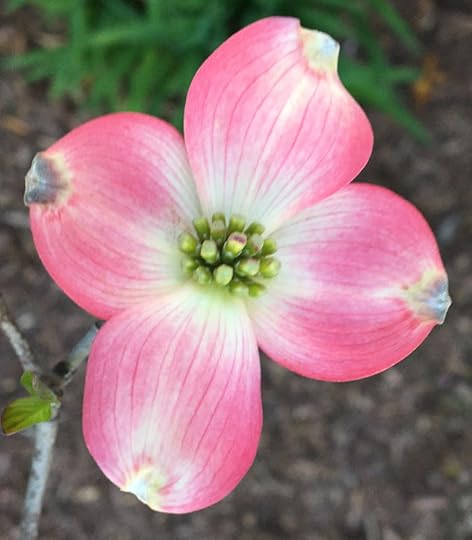




April 10, 2023
Christina Grimmie and the Resurrection
Young singer/songwriter/musician Christina Grimmie loved Easter, and joyfully shared her faith in the resurrection of Jesus. Today, Easter Monday, marks 6 years and 10 months since she was taken from this earthly life at the age of only 22.
On the dark horizon of so much violence and death in today’s world, Christina’s giving of herself in love every day—and ultimately in the mercy of “welcoming a stranger”—shines like a bright beautiful star that continues to point to the hope of the resurrection.🎵💚

April 9, 2023
Easter Sunday 2023
We’re all together on this beautiful day. Happy Easter Sunday to everyone! Christ is Risen! He is truly Risen, Alleluia! Alleluia!


April 7, 2023
A (Virtual) Visit to Rome for “Holy Friday”
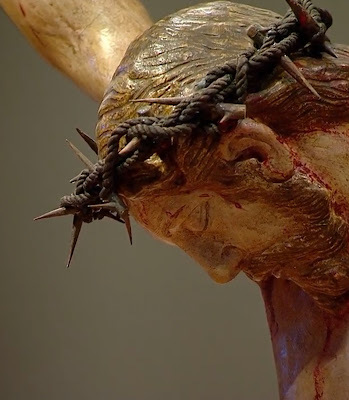 In recent years, I have made use of streaming audiovisual media in order to have some share in the liturgies of Holy Thursday and Good Friday. I am glad to make it to my parish church every Sunday (it is sometimes my only “public outing” of the week), as I shall also do on Easter Sunday. For the other wonderful Triduum liturgies, however, I am grateful to be linked through media to these celebrations which would be too difficult in my condition to attend in person.
In recent years, I have made use of streaming audiovisual media in order to have some share in the liturgies of Holy Thursday and Good Friday. I am glad to make it to my parish church every Sunday (it is sometimes my only “public outing” of the week), as I shall also do on Easter Sunday. For the other wonderful Triduum liturgies, however, I am grateful to be linked through media to these celebrations which would be too difficult in my condition to attend in person.Nearly 30 years ago, I was living in Rome, and the city will always remain rooted in my heart. Thanks to the Vatican News YouTube channel, I can see and hear the Good Friday liturgy “at Saint Peter’s Basilica.” Although it began a bit early in the day in the USA, the live-stream enriched the whole rest of the day.
After it ended, I “rewound” at my leisure to take some screenshots. Everything here comes “courtesy of” Vatican News (and I’m counting on them to be very courteous indeed, since I didn’t ask for permission—but I am presuming that the educational, edifying, and entirely nonprofit purposes of this tiny blog are sufficient that they would say, “va bene”😉).
If you have not been to Rome, you must go. Until then, here are some images from the service.

Entering Saint Peter’s is stunning even after it becomes familiar. And though it glitters and is filled with masterpieces of art, we must never forget that it’s a church. It belongs to the worship of God and to all the people of the city and the world, free of charge.
********************************************************************************

Here bishops, priests, and people wait for the liturgy to begin.
********************************************************************************

Pope Francis, with concelebrants, deacons, and acolytes, enters from behind the altar. The wheelchair remains necessary for his knee and leg problems, but otherwise he is in good health once again.
********************************************************************************

The first reading is proclaimed, from the “Suffering Servant Song” in Isaiah 52:13-53:12. “He was pierced for our offenses, crushed for our sins; upon him was the chastisement that makes us whole, by his stripes we were healed” (Isaiah 53: ).
********************************************************************************

The choir chants the Responsorial Psalm 31. “Into your hands I commend my spirit.”
********************************************************************************

Two older (probably European) bishops join in the responses. Behind them are two young seminarians; one appears to be Asian and the other African. The Church gathers the peoples of the whole world into Christ’s Body.
********************************************************************************


The chanting in Latin of the Passion of Our Lord Jesus Christ according to John’s Gospel (chs 18-19).
********************************************************************************

The homily is preached by Cardinal Raniero Cantalamessa, who has been the Preacher to the Papal Household for longer than I can remember. It’s always good to see and hear him!
********************************************************************************

After the Good Friday Intercessions, the procession begins for that very precious feature of the ancient Good Friday Liturgy, “the Adoration of the Holy Cross.” I’m not the only person so struck by this beautiful crucifix to be moved to “take pictures” of it. In the crowd you can see mobile devices everywhere held aloft. More closeups below, from Vatican Media’s top notch videographers:
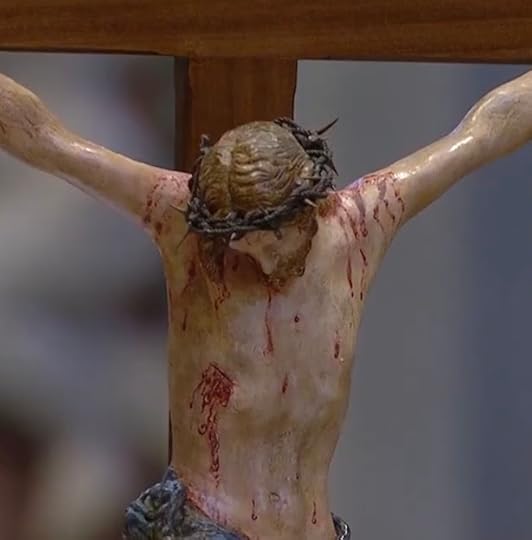





********************************************************************************
The Cross is brought to Pope Francis.
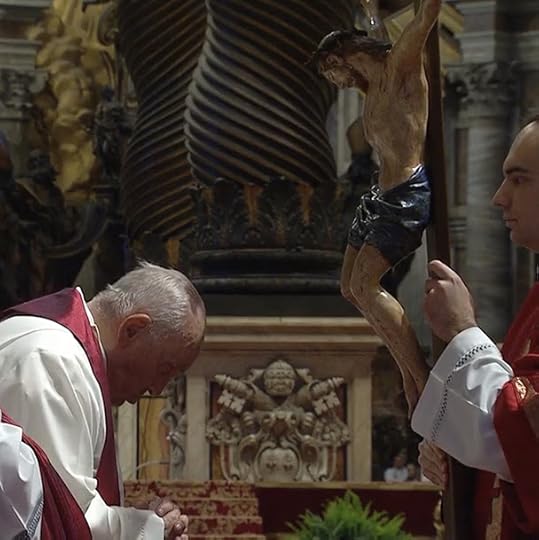

After the 86-year-old Bishop of Rome kisses the Cross, it is presented to a representative group of the people individually, and then held up once more to the whole congregation for silent prayer.
********************************************************************************

The Cross is placed on the altar. Another procession enters with the Eucharist—already consecrated at the Holy Thursday liturgy (here is the one instance in the restored Latin rite where the ancient practice is followed that has been in use continually—at selected times, including Holy Week—in the Eastern Churches, where it is called the “liturgy of the presanctified gifts”).
I am moved by the profile of our holy and devoted Pope Francis, whose has served Christ his whole life in often difficult circumstances in Argentina, who was often misunderstood, who grappled with many conflicts in society and the Church, and who has now given to the Lord, to Rome, and to the whole world the ardent and tireless service of this past decade in the evening of his long life. Let us continue to thank God for him and to pray for him.
********************************************************************************

After praying the Lord’s Prayer, the priest raises up and consumes one of the “presanctified” hosts—the true Body, Blood, Soul, and Divinity of Jesus Christ our Savior—and the others are given to the faithful as Holy Communion.
As I have become accustomed to doing (even before the COVID pandemic made this particular gesture familiar and necessary for people everywhere who wanted to participate in the life of the Church), I prayed the prayer of “Spiritual Communion” in front of my television.
It is no small consolation, this great gift of Christ’s love, which has nourished me greatly in these moments. And now, I hunger all the more for the fullness of sacramental Communion on Easter Sunday. Jesus Christ crucified and risen is the strength and hope and the love of my life.
April 6, 2023
Walking the Paschal Way in 2023
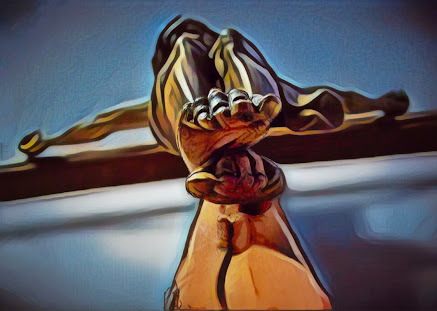 The days have come in which we celebrate the greatest events—the most mysterious and most revealing events—in all the ages of this vast universe; the events that encompass and ultimately define all of the meaning of the cosmos, of human history, of every nation and people, and of the lives of each one of us. Of course, I mean the events of the death and resurrection of Jesus Christ, the Only Begotten Son of the Father, the Word made flesh, incarnate God, true God and true man, the Savior of the world, the Lamb of God who takes away the sins of the world, the One who has been “lifted up” and is drawing all things to Himself.
The days have come in which we celebrate the greatest events—the most mysterious and most revealing events—in all the ages of this vast universe; the events that encompass and ultimately define all of the meaning of the cosmos, of human history, of every nation and people, and of the lives of each one of us. Of course, I mean the events of the death and resurrection of Jesus Christ, the Only Begotten Son of the Father, the Word made flesh, incarnate God, true God and true man, the Savior of the world, the Lamb of God who takes away the sins of the world, the One who has been “lifted up” and is drawing all things to Himself.The Paschal Triduum comes at a difficult period of time for me personally and for the world, where many momentous human crises are unfolding. We remain on the edge of possibilities and perils, and we know very little of how they will ultimately turn out.
I was born and grew up in a society in which the 19th-20th centuries’ titanic achievements of human power over the physical world were simply facts of daily life. In the 1960s an intense optimism prevailed in Anglo-American society about the apparently “limitless” capacities of the power of science to make humans the masters of the world, and that this power would be used to “make the world better.” I have lived my adult life to this day in an increasingly complex and troubled period of history, in which we have begun to realize the dangers of our power even as we continue to expand and develop its reach ever more deeply into our environment, our mobility, our modes of perception and the expectations they engender, and even the structure and functioning of our bodies.
We are also slowly discovering—in the face of many complications, failures, and disasters—that there are “limits” to our power, that it bears fruit only as an aspect of the journey of the lives of human persons on the road of the delicate and precious earth that has been given to them. We need patience and wisdom on this path; we need open hearts to embrace its hardships, and trust to discover the possibilities that we don’t “own,” but which nonetheless invite us to a collaboration that engages all of our reason, freedom, and enthusiasm—including our vast technological competence—in the marvelous adventure of being human.
In fact, the world is a “sign” that points us toward something greater: a limitless goodness, meaning, loving, all-encompassing and transcending fulfillment that we long for but cannot manufacture by our own power. Not that many of us don’t try to grasp this fulfillment, measure it, control it, hoard it to ourselves or our group as the basis for our claim to “superiority” over others. This presumption begets violence. And we see violence all around us in the world of 2023.
In my life, I have learned a few things about both the possibilities and the limits of the power of medical science. There is no cure for previously untreated late-stage Lyme Disease, but there is—if not a “cure”—at least the possibility of doctors helping us to put together an idiosyncratic regimen of life (including several carefully monitored prescriptions medications) that has kept me more-or-less physically and mentally “stable” for many years—important years during which we have raised our children. I continue to endure various limitations from my chronic illness and its effects, which means that I won’t be running any marathons (or walking any walk-a-thons).
I don’t know what it might mean in the future, but at present I can still amble about and I can still read, study, and “stay on top of” current events. And I can still write, though it is becoming a bit harder because it requires so much energy (and you never realize how much energy a task requires until your energy is depleted by incapacity or [and!🙄] the process of aging). I feel like I am enrolled in the long school of learning-to-let-go, and I’m very stubborn. The is something deeply ambivalent about my stubbornness, but it’s in some respects a good thing. I want to live intensely the life I have been give, to aim myself at its purpose, to focus on what matters—what has been entrusted to me—and to learn from the mistakes I will inevitably make.
There are times when I feel anxious or perplexed, and I wonder what role (if any) I still have as a force for good in the world, a constructive presence to people near and far. The ongoing explosive transformation of media technology is broadening the ways we become aware all over the face of the earth of one another’s particular identities, hopes, and problems. This can become disorienting, or shallow and disengaging, so that we are inclined to be cynical or contemptuous of the neighbor who lives so far from us, who appears so “alien” to us, who expresses different opinions that we can so easily lash out against. On the other hand, if we are willing to invest ourselves as human persons on the Internet, there may emerge new possibilities to learn about one another and help bear one another’s burdens. The light of Jesus can shine through the Internet in ways I never would have guessed if I hadn’t experienced them myself. Media technology generates an “environment” within which we interact, and even a kind of personal and interpersonal “space” that so many people—for better or for worse—“inhabit” for significant portions of their day (the late Pope Benedict XVI called it “the digital continent”). It is a space that needs our attention; a space where people can be found and served. But it cannot be the foundational place for the whole human person, the bodily person who dwells in a physical place and time, and who needs companionship and love primarily and immediately in that place where they breathe, hunger and thirst, live and die.
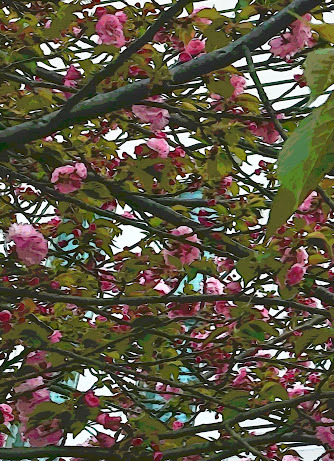 In my own circumstances, there are some basic facts that I must remember. First off—though it’s sometimes hard for me to believe (with what remains of my depression and all my emotional immaturity) that I really have value as a husband, a father, and a grandfather—clearly I matter to my family. What I do and what I suffer affects them, because relationships are real and when we try to pretend otherwise we do real harm to ourselves and those who have been entrusted to us. I thank God for them, and I hope and pray that I can serve them, love them, and always be grateful for them.
In my own circumstances, there are some basic facts that I must remember. First off—though it’s sometimes hard for me to believe (with what remains of my depression and all my emotional immaturity) that I really have value as a husband, a father, and a grandfather—clearly I matter to my family. What I do and what I suffer affects them, because relationships are real and when we try to pretend otherwise we do real harm to ourselves and those who have been entrusted to us. I thank God for them, and I hope and pray that I can serve them, love them, and always be grateful for them.There is another sphere of human relationships that we engage by our work. I hope my long, laborious studies will form my own mind and heart with a deeper understanding and compassion. In my reading I discover the expressions of so many voices that long to be heard. I want to engage them not merely as a means for gathering information, but first of all to listen to them. Listening is an elusive and difficult task that produces no immediate external, tangible “product.” Our turbulent, rushed, mass-consuming, “results”-oriented, hyperpartisanized society lacks the patience for listening. Still, there can be no dia-logue, no true inter-relationship between persons, no real human solidarity in our world, no space for giving and receiving mercy to one another, without listening. I want to take advantage of the special opportunity that the circumstances of my life give me (since I can read even while lying in bed, and this aspect of my mind is still full of vitality) and read—not in a distracted way, not just to “pass time,” but as a real work undertaken with awareness, attention, and discipline, making the effort to listen to the voices of people telling their stories of their joys and sorrows, and to make the “prayer” of their hearts in some sense my own.
I also have active communications skills, and I hope that my writing and other expressive work serves at least the few people who read, see, or hear it. One reason I write is in order to share with others some understanding of the larger picture of the world in which we live. We must care about what’s happening in our world, and bring to it (in whatever ways we can) the resources of mercy. Often the “works of mercy” are hidden, but they are essential to the Christian vocation in the world. My hope is that we might begin to cultivate a kind of “empathy” (a “seeing-things-from-the-perspective-of-others”) that enables us to respond constructively to the blizzard of information and all the elements of interconnectedness that link us in unprecedented ways to human experiences, human suffering, and human violence all over the world. Through empathy we can discover concrete ways of being-together with greater solidarity and fraternal love.
It may seem easy enough to cultivate empathy for persons and peoples who are undergoing great trials (though it requires attention and persistence if empathy is to become something more than a brief shallow sentiment). But we also must not hold ourselves aloof from some form of empathy (some effort to recognize the wounded humanity we share) even for those who are involved in causing troubles and imposing afflictions on others. This does not mean that we should not struggle against the evil they do, but it means that we cannot fight against their evil without also fighting “for” their humanity, for their change-of-heart and their healing (which we all need, in various ways—which makes us all beggars before the mercy of Christ).
We are all human beings, human persons. We all matter to the One who was crucified for all of our sins and who rose from the dead for all of us, the One who wants all of us to live forever with him. The most difficult position of all, of course, is to actually to love and to be willing to forgive those who cause direct harm to ourselves. We know how hard it is to forgive even small injuries inflicted upon us. It is a work of mercy that grows, that must be continually renewed in our hearts so as to fill all the spaces where bitterness and grudges can still be stirred up. Jesus enables us to embrace the willingness to forgive others within the grace and strength of His forgiveness offered to all of us from the Cross. He suffers with us, reveals the Father’s mercy, and empowers us to be merciful, to “love our enemies and pray for those who persecute us.”
There is so much suffering in the world, so much loneliness, so much ignorance of God’s infinite love. Those of us who have encountered the crucified and risen Christ—how can we not want to share the Gospel of His amazing love with everyone? We feel so inadequate, but if we entrust ourselves to His mercy and allow the Holy Spirit to enlarge our hearts, He will make us instruments of His mercy, according to His plan. He will enlighten our path in humble works of mercy that the world needs so desperately. He will teach us to pray, to beg for mercy for ourselves and for all those whose immense needs are crying out within our families, communities, nations, and everyone in this excessive, over-lit, noisy, burned-out, conflicted, exhausted world. He will enable us in our weakness and frailty to suffer-with those who suffer.
April 5, 2023
My Father’s Flowers
These flowers remind me of my father, because they were blooming so brightly in the church garden four years ago, on the day of his funeral (April 10, 2019).
Holy Thursday this year is the 88th anniversary of his birth.

April 3, 2023
On the 4th Anniversary of His Death, Dad is Still Teaching Me
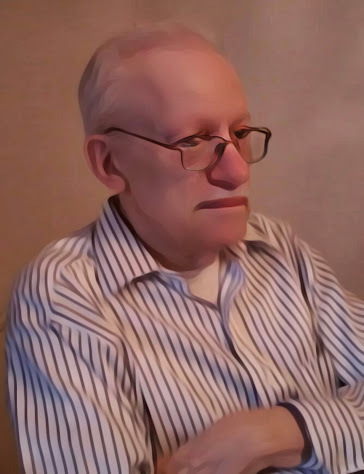 Dad passed away four years ago. They have been “big years”—his grandchildren have grown up, two have gotten married, Mom has joined him, and I am now the “Papa” in the family. I entrust him with confidence and love to the heart of Jesus who has defeated death, who brings eternal life.
Dad passed away four years ago. They have been “big years”—his grandchildren have grown up, two have gotten married, Mom has joined him, and I am now the “Papa” in the family. I entrust him with confidence and love to the heart of Jesus who has defeated death, who brings eternal life. I am more and more grateful for my Dad. As I grow older, I feel like I “understand” him better, in part because I see how I am in many ways resembling him more and more—the “apple [really] doesn’t fall far from the tree”—and I see more clearly how his quiet attention was full of love for us—love that became more “gratuitous” over the years.
I am not “quiet and simple” the way he was, but I understand more how he saw his family and all of life as a gift. His love, always consistent, was his response and his gratitude for this gift—which he didn’t need to understand completely or to dominate in order to receive it and engage himself in the effort, responsibility, and creativity it required.
The gift of life, his family, and his work drew him all through his years, embodying and signifying the embrace of Love that was always present as his sustenance and his destiny—greater than the terrible wounds of the deaths of his own parents when he was a child, greater than the mistakes and failures and limitations that came every day, full of forgiveness and renewal, embodied and signified, too, in our own poor love for him and our “suffering with him” (at his bedside and in our own hearts) in his final days.
Dad is still teaching me to grow in patience and peace of heart, and gentle, consistent fidelity to the gift of everything (even now, while I continue to be noisy and ambitious and anxious—although *less* so as time passes). The Gift is greater, remains with us, carries us through our failures and incomprehension and even our betrayals.
As I become older and remember my Dad’s affection and tenderness toward us and his grandchildren in his older years, it strikes me that older people often live with a greater and deeper attention than we give them credit for in our youth. They look upon us with a kind of serenity that is akin to wonder, recognizing all the goodness in our being and growing, more easily forgiving our inattentiveness and superficiality because they’ve seen so much of that through the years; it doesn’t surprise them or disappoint then much anymore, but what does surprise them is the tenacity of the goodness of reality, the promise of fulfillment that endures in all the persons and all the positiveness of reality that are given to them in the present moment.
I think older people look upon us with immense gratitude and compassion, even when they seem to be grumpy—and Dad was never grumpy before his mind failed, and even after that it was more confusion and frustration than grumpiness. I’ll always remember how he would see Josefina and burst into a huge smile (even after he had forgotten her name). That smile, ultimately, was meant for all of us.
So many elderly people are lonely and they suffer greatly from it. But they have so much to give, and we who neglect them are perhaps the ones who are more impoverished. We hold back from their love because we are “too busy” or too distracted or too afraid. We are preoccupied with desperately trying to manufacture an artificial, broken, distorted, cheap imitation of the happiness that is offered to us every day as a gift. We ignore the gift, or we don’t trust it. We think our happiness depends on our own plan, our own ideas, our own power. But we don’t know what we want.
The elderly have passed through all of this, and now their plans are few and they have lost their power (some even lose their “ideas” or ability to think). They are tempted to bitterness and discouragement. But they can also be surprised to encounter anew the beauty and goodness and promise of the gift of life, the gift of being human, that has never abandoned them, that is still offered to them, and the Giver who is the depths of all gifts; indeed, the Giver who has *become the gift* and shares their powerlessness in the Love that “wants to” stay with them, always: the Love we all desire, the Love that alone can give us peace.
Thank you Dad, for everything. May the Lord fulfill you in His eternal embrace, where—I hope and pray—we will all be together again in the end, with every tear wiped away, forever.
April 2, 2023
Palm Sunday: The “Reckless Love” of Jesus
Palm Sunday 2023. Holy Week begins in a world full of violence, suffering, and “every form of loneliness and isolation.” Our hope in the midst of all this overwhelming misery is in the “reckless love” of Jesus Christ. Pope Francis urges us to “implore this grace: to love Jesus in His abandonment and to love Jesus in [those who are] abandoned”—those who are “rejected and excluded,” who are therefore “living icons of Christ” in His “forsakenness,” and who are “all around us.”
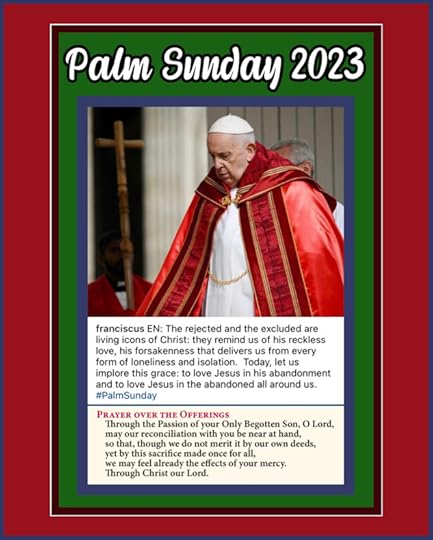
March 31, 2023
Rough Month for the Forsythia
Having visited the forsythia bushes in my neighborhood (not just my own), the consensus seems to be that they have had a rough month. Crazy March 2023 –– “wow, it’s warm, let’s open up!” … “woah, freezing, we’re shriveling!” … “it’s HOT now, how nice…no, COLD!” Our favorite yellow flowers look a bit tired this Spring. They have muddled through, but I don’t think they “feel” very pretty.🌼🌿🌦☁️🌥🌾
March 29, 2023
And The Winner is… China?
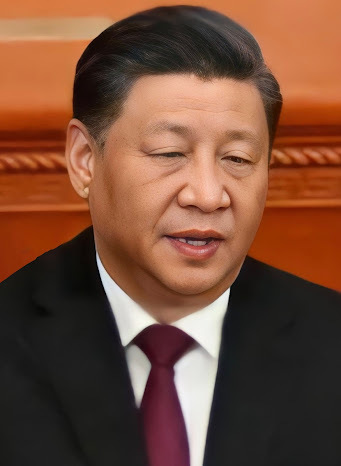 Allow me, for a moment, to engage in a bit of “fantasy-politics,” to make some sweeping generalizations about recent political events. They are connected to the ongoing war in Ukraine, and the increasing desperation and intransigence of the Kremlin in Moscow. We know much about the Kremlin’s tragic, self-inflated ambitions and the consequent injuries they continue to inflict on invaded Ukraine and Russia itself. But recently another agent appears to be entering the scene whose motives are more obscure. Therefore, I will employ rhetoric that paints a picture with a broad brush, in fantastic colors. We live in strange times, and we can hardly make them stranger by giving space to the imagination as we wonder about the optics of what happened last week.
Allow me, for a moment, to engage in a bit of “fantasy-politics,” to make some sweeping generalizations about recent political events. They are connected to the ongoing war in Ukraine, and the increasing desperation and intransigence of the Kremlin in Moscow. We know much about the Kremlin’s tragic, self-inflated ambitions and the consequent injuries they continue to inflict on invaded Ukraine and Russia itself. But recently another agent appears to be entering the scene whose motives are more obscure. Therefore, I will employ rhetoric that paints a picture with a broad brush, in fantastic colors. We live in strange times, and we can hardly make them stranger by giving space to the imagination as we wonder about the optics of what happened last week.First let us recall that, for centuries, nations and their proud leaders have tried to conquer Moscow. The Poles. The Swedes. Napoleon. Hitler. They have all failed, after lengthy and terrible battles.
Yet last week a very ordinary looking man in a business suit took the great Russian city and put it in his pocket in only three days. He did it without firing a shot. In fact, he didn’t even have to invade, because another man—who fancies himself the Tsar of “all the Russias” (including those who deny being part of Russia, who are internationally recognized independent nations)—invited the conqueror to come.
Ah yes, “the man in the business suit.” He seems like such a nice man.
I do not know what he wants for his country, other than power—stupendous power. He speaks about his desire to build a harmonious, moderately-prosperous society in a harmonious, interdependent world. He may have some very interesting ideas (remember, we’re still doing fantasy-politics here). Sometimes he seems like a “visionary,” a man with a Dream—a new proposal not only for his own people[s] but for the entire world order. Soon (if not now), he may be able to claim to be most powerful man on earth. He has ruled over one-fifth of the world’s population for over a decade (with no end in sight), and he has endured some crises during that time that would have defeated other less-focused, less self-confident leaders.
Of course, there is a “Dark Side” to this new political “Force.” He certainly prefers persuasion and consensus with willing allies for the growth of his dream. But since humans can be stubborn, he is willing to let the multitudinous forces under his command use other means: there is plenty of the ancient bureaucratic corruption and bribery, along with innovative 21st century techniques such as technological theft and social surveillance. Above all, his minions enforce obsessive restrictions on any kind of information (and people) that might disturb the existential slumber of a million and a half “patriotic dreamers” and/or others who go-with-the-flow while pursuing their own personal dreams of upward mobility and wealth. Groups who cause trouble are “re-educated,” using what one might call vigorous pedagogical techniques that our “man-in-the-business-suit” prefers not to share with the rest of the world. He is, after all, making enormous omelets in an unprecedentedly gigantic and unwieldy frying pan. Lots of “eggs get broken” in this messy process: large eggs, huge eggs, eggs as big as entire cultural, linguistic, and religious minority groups—into the Brave New Omelet they go… or into the trash.
The Russian Tsar Vladimir “Vlad-the-Bad” Putin is placing more weight on what he thinks is an alliance of sorts with the man-in-the-business-suit. But our man has a plan, a very, very big plan, and he regards Putin and Russia as a useful part of his plan. He has proven to be a brilliant opportunist whenever it becomes possible to integrate other nations into his plan (all for the sake of “harmony,” of course). Most people in the West don’t know his name, or—if they have seen it—they can’t pronounce it.
China’s current claimant of the Mandate of Heaven (“Leninist Heaven,” ironically) is Xi Jinping (SHEE jin-PING), and he is not a stupid man. That much can certainly be said. He has maneuvered himself into a lifetime grip on all the most important offices in China’s complicated and obtuse PartyState. Head of the Party, head of the “State” it controls, head of the Peoples Liberation Army, Xi has monopolized power in China in a way not seen since Mao Zedong. Yet he is very different from Mao; he is a ruthless practical idealist whereas Mao was… well… basically a megalomaniac. Their “beliefs” also differ. Mao believed in Communism, revolution, and—above all—the quasi-divine status of himself. Xi is more humble (though it doesn’t take much to be more humble than Chairman Mao, the Great Helmsman, the Red-Sun-Rising-in-the-East).
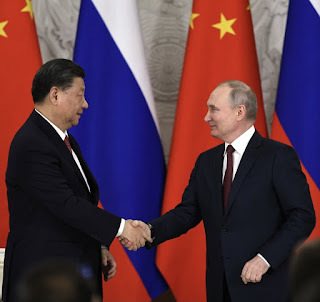 Xi wears “Communism” lightly. He advocates for socialism, but what he really wants is a kind of “National Socialism” (of course, he doesn’t use this Nazi-tinged term, nor the similarity discredited “fascism”). Instead he calls it “Socialism-With-Chinese-Characteristics.” There is little left here of Lenin’s class-struggling, world-revolutionary Marxism led by an international Communist Party “vanguard.” What remains, however, are Lenin’s techniques for seizing and holding onto a kind of political power that invades every aspect of human life, and the multi-layered pervasive political organization (the Party) that “plans” the direction of national life, enforces a unified “party line,” and uses fanatical surveillance to crush—or at least marginalize—any kind of wider examination and discussion, sincere “constructive” criticism, and certainly dissent from the party line.
Xi wears “Communism” lightly. He advocates for socialism, but what he really wants is a kind of “National Socialism” (of course, he doesn’t use this Nazi-tinged term, nor the similarity discredited “fascism”). Instead he calls it “Socialism-With-Chinese-Characteristics.” There is little left here of Lenin’s class-struggling, world-revolutionary Marxism led by an international Communist Party “vanguard.” What remains, however, are Lenin’s techniques for seizing and holding onto a kind of political power that invades every aspect of human life, and the multi-layered pervasive political organization (the Party) that “plans” the direction of national life, enforces a unified “party line,” and uses fanatical surveillance to crush—or at least marginalize—any kind of wider examination and discussion, sincere “constructive” criticism, and certainly dissent from the party line. Another Leninist standard that remains is utter lack of transparency regarding intra-Party activities: decision-making in secret. This doesn’t help us to understand what Xi’s real program is all about. We are required to distill some ideas from his actions, public speeches and writings, and propaganda. Xi is not looking to “conquer the world.” What he aspires to—it seems—is to reconstruct in the 21st century the legendary China as the center of the world, a China of widespread “moderate prosperity” for all its citizens that will be exemplary and honored everywhere, possessing powerful “influence” and connections in the development and economic endeavors of many nations, receiving gratitude and “given face” (this particularly East Asian sense of visible stature) from the rest of the world. And, of course, doing unhindered and lucrative business everywhere.
This is what many China-watchers surmise about Xi Jinping’s China Dream. The steps to achieving the dream require us to speculate, or else to listen to the Chinese Communist Party’s explanations of what it is trying to do. The problem here is that we are far from confident that in this realm the CCP has given up one of the most fundamental Leninist principles: LYING. Of course, every government lies when it deems it “necessary.” But history has never before seen anything like the systemic structure of lies that are woven into the very fabric of Communist parties. Xi Jinping is a creature of this structure. His words are subtle, to say the least.
This is why I think Xi’s most recent diplomatic visit to his struggling Russian “friend” Vladimir Putin in Moscow was a big win for the advancement of the China Dream. Notwithstanding China’s verbose “peace plan” (which distracted the West but scored leadership points with the many unaligned nations of the global south), the visit had little to do with the war in Ukraine. It was a publicity visit, large on glitter and show by the Russian host but small on perceivable content offered by the Chinese guest. The two countries have been trying to build a “comprehensive partnership” in recent years (especially since 2014, when Russia fell out with the West over the invasion and annexation of Crimea from Ukraine).
Obviously, Putin needs his new Asian partner more than ever these days. He needs to build back credibility with the Chinese, who are annoyed by this war that was supposed to take five days but is still raging after a year. The Chinese want global stability. They will not help Putin escalate a war that has exposed Russian military incompetence by giving him more weapons that will only make things worse. They wince at Putin’s nuclear threats. China also wants a stable, functional Ukraine to trade with and include in its future plans to connect with the rest of Europe. Making peace between Russia and Ukraine (and the West) is probably beyond China’s mediating powers at present, but it looks good for them to at least make a show of trying.
Putin has more pressing needs from Xi right now. Sanctioned by the West, Russia needs to sell its abundant natural gas and China is buying it—at bargain prices. China is also stepping in to provide consumer products to Russia which will help make up somewhat for the absence of Western trade. Then the two countries have “common projects” in Eastern Russia as well: projects to tap into natural resources there. These were all matters of discussion that filled up pages of common statements at the most recent meeting. Putin was grateful that Xi was willing to stand with him on the global stage and treat him like something more than a disgraced world leader. For his part, Xi made no special promises other than glowing affirmations of “special friendship.”
All these circumstances have added up to Xi and the Chinese getting “lots of face” in the global village.
Xi wants to play (or at least appear to play) the role of peacemaker, where China had such recent success in brokering a deal between Saudi Arabia and Iran. Indeed, Xi aspires to make China a global diplomatic powerhouse, which complements well his plans to continue constructing the “new Silk Road” linking China across Central Asia to markets in Europe and Africa. This includes massive building and infrastructure projects in Central Asia (including several former Soviet republics), and Xi wanted to make it clear that these countries do not have a place in Putin’s hopes to restore a “Greater Russia” such as that which prevailed during the Soviet-era rule in those nations. Putin may mourn the collapse of the Soviet Union, but he cannot bring it back. Indeed, it is being clarified that Central Asia is no longer part of the wider Russian “sphere of influence.” The Chinese now have not only the claim and the investments, but also the leverage against their weakening Russian partners. China is the new influencer in the region.
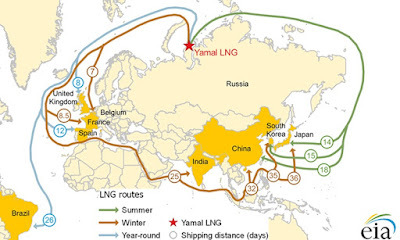 Then, to the north, lies Russia’s access to ports on the increasingly navigable Arctic Ocean. Xi wants more freedom to use those arctic ports, and stake a few [or more than a few] claims on the vast riches of the region. Russia and China have been collaborating on a project to access liquid natural gas in Siberia, focusing on the arctic port city of Yamal. China has built a large (controlling?) presence in Yamal, but at their recent meeting Xi had to inform his friend Vladimir that the Chinese would have to “suspend” plans to help build a Siberian natural gas pipeline (which doesn’t prevent shipping Yamal’s LNG all over the world, which the Chinese would be glad to do). Working on a big infrastructure project with Russia right now is “problematic.” This is because Xi’s grand plans also require collaboration with Western friends (or, at least “frenemies”) and he cannot afford to brazenly ignore Western sanctions against Russia. Since their friendship is so “special,” Xi is confident that Putin will understand the delicate position that China is in right now (or if not, Putin will just have to swallow it—and he might as well get used to it, because he’ll have to take what he can get in the future from China).
Then, to the north, lies Russia’s access to ports on the increasingly navigable Arctic Ocean. Xi wants more freedom to use those arctic ports, and stake a few [or more than a few] claims on the vast riches of the region. Russia and China have been collaborating on a project to access liquid natural gas in Siberia, focusing on the arctic port city of Yamal. China has built a large (controlling?) presence in Yamal, but at their recent meeting Xi had to inform his friend Vladimir that the Chinese would have to “suspend” plans to help build a Siberian natural gas pipeline (which doesn’t prevent shipping Yamal’s LNG all over the world, which the Chinese would be glad to do). Working on a big infrastructure project with Russia right now is “problematic.” This is because Xi’s grand plans also require collaboration with Western friends (or, at least “frenemies”) and he cannot afford to brazenly ignore Western sanctions against Russia. Since their friendship is so “special,” Xi is confident that Putin will understand the delicate position that China is in right now (or if not, Putin will just have to swallow it—and he might as well get used to it, because he’ll have to take what he can get in the future from China).The shift in Putin’s position of influence here is subtle. But one could see it as an example of “losing face.”
The Russia-China partnership is evolving in such a way that Russia increasingly finds itself the “junior partner” that may be required to depend even more on China if the war in Ukraine goes on. That’s not exactly what one would call a “conquest,” but it is a material advantage that—in the increasingly wild world of the 21st century—may prove more efficient and lucrative for an ancient land that dreams anew of being “the center of the world” in the near future.



